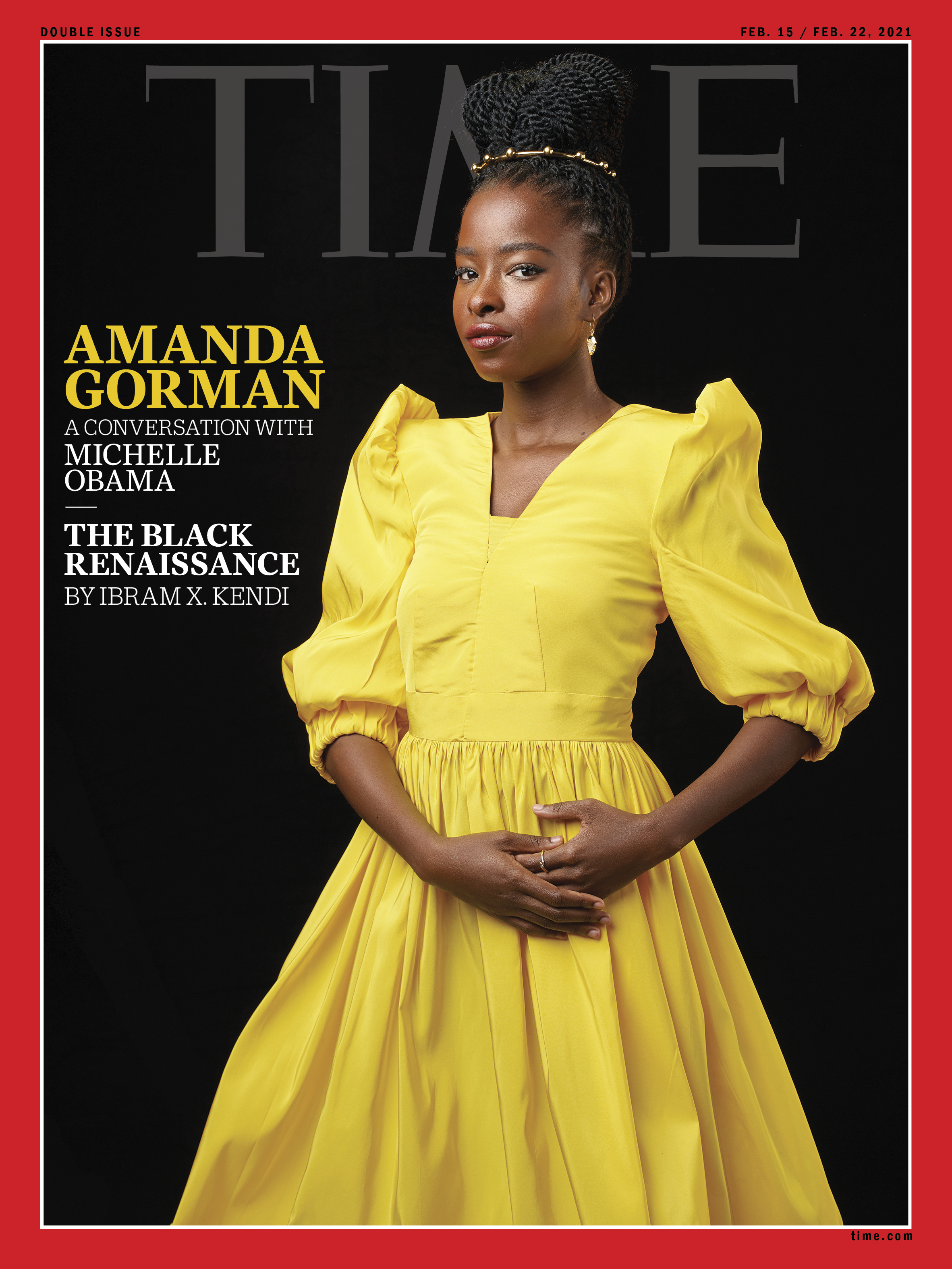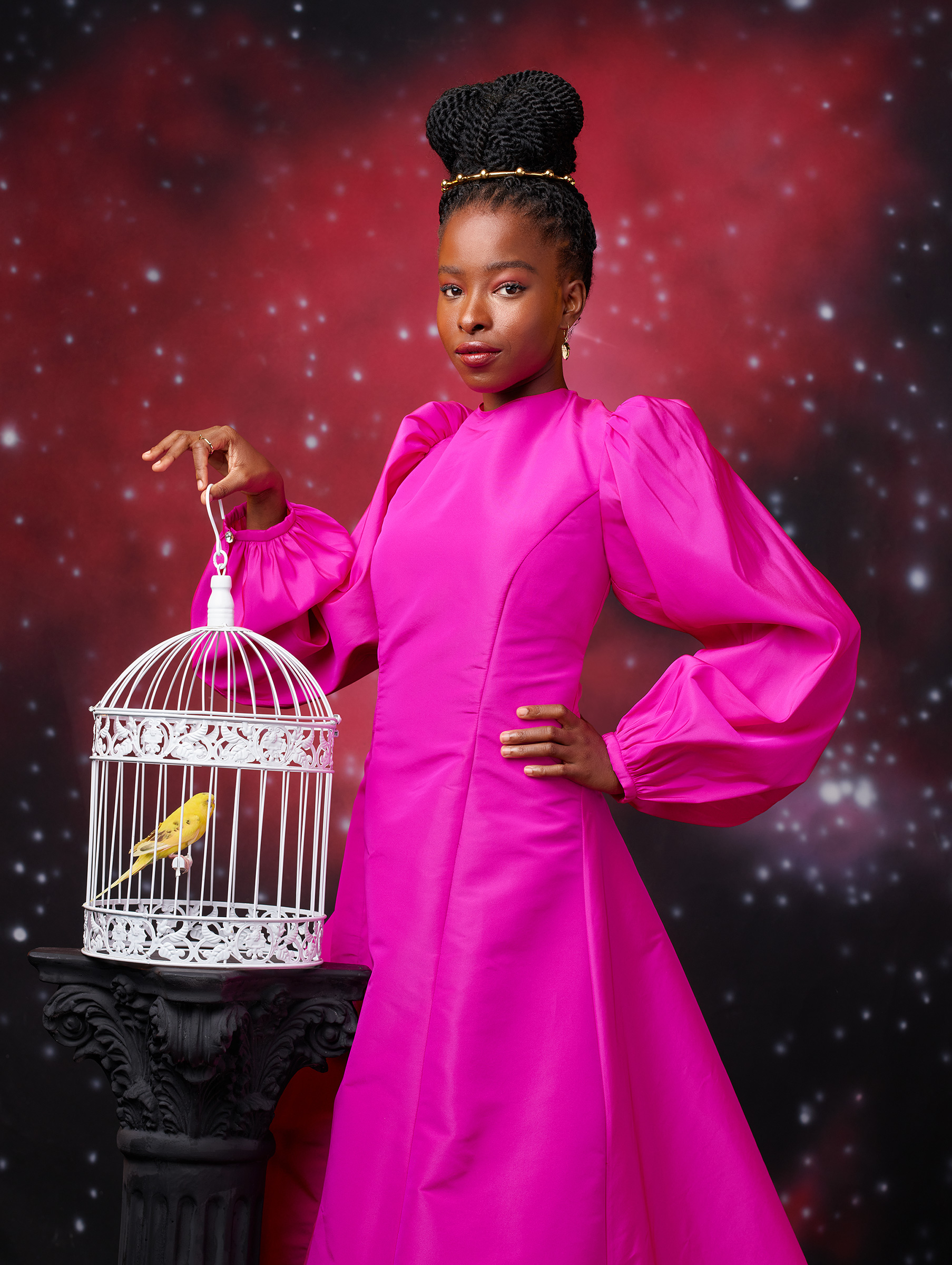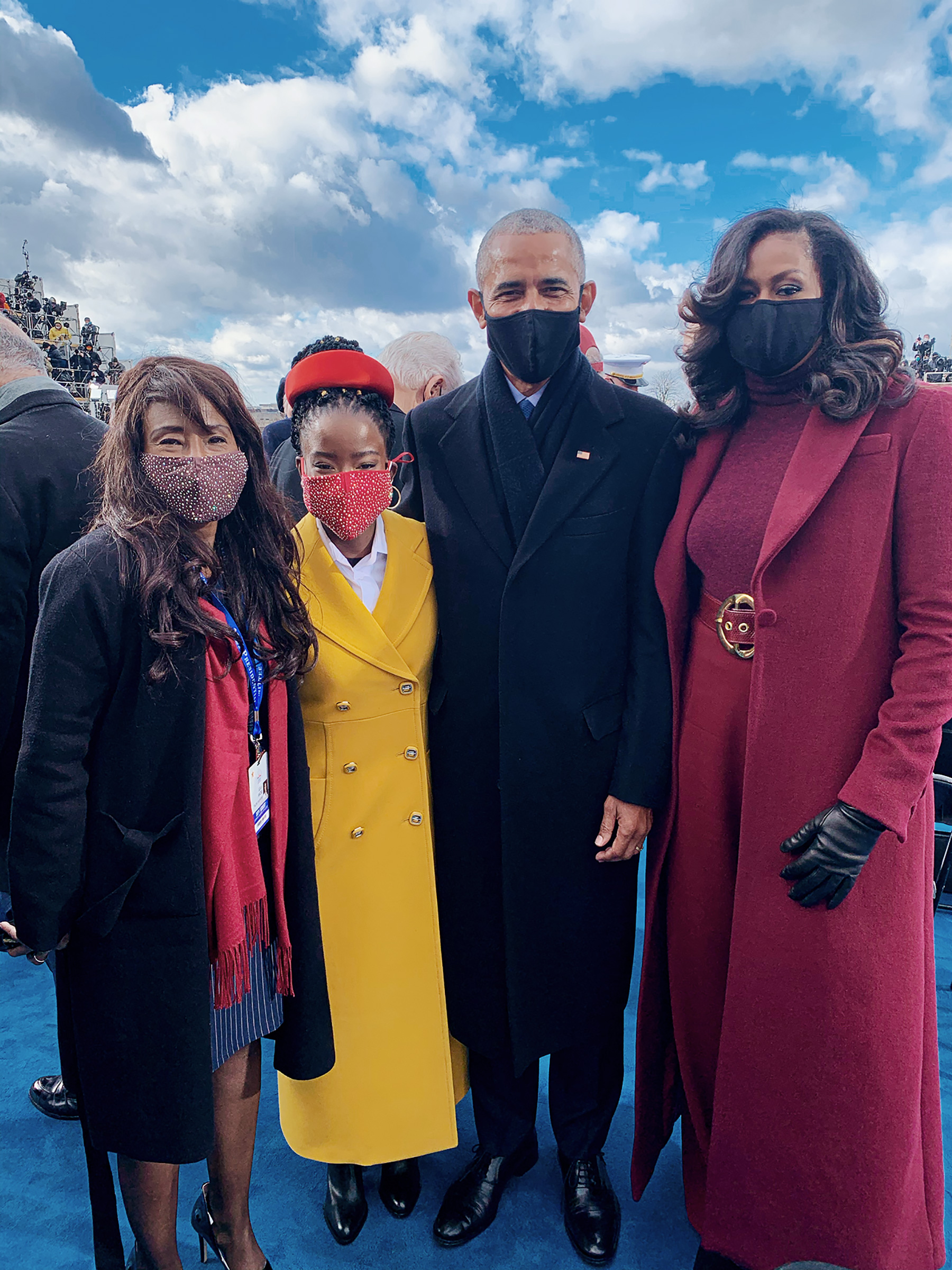Amanda Gorman captivated the world when she read her poem “The Hill We Climb” at President Joe Biden and Vice President Kamala Harris’ Jan. 20 Inauguration ceremony. Sitting just feet away from the 22-year-old that day was former First Lady Michelle Obama, who had met Gorman twice before—in 2016 at a White House event for the National Student Poets program and again at a 2018 event for Black Girls Rock, an organization that seeks to empower women and girls. Gorman, who was named the first National Youth Poet Laureate in 2017, emerged in an instant as the latest inspiring young artist of the renaissance. Her three upcoming books shot to the top of Amazon’s bestseller list and the NFL soon announced plans for her to recite an original poem at Super Bowl LV. In a remote interview, Gorman and Obama covered topics ranging from the role of art in activism to the pressures Black women face in the spotlight.
Michelle Obama: We’re here to talk about the current renaissance in Black art—this surge of creativity we’ve seen over the past six years or so. What do you make of calling this period a “renaissance”? And where do you see yourself within it?
Amanda Gorman: We’re living in an important moment in Black art because we’re living in an important moment in Black life. Whether that’s looking at what it means politically to have an African-American President before Trump, or looking at what it means to have the Black Lives movement become the largest social movement in the United States. What’s been exciting for me is I get to absorb and to live in that creation I see from other African-American artists that I look up to. But then I also get to create art and participate in that historical record. We’re seeing it in fashion, we’re seeing it in the visual arts. We’re seeing it in dance, we’re seeing it in music. In all the forms of expression of human life, we’re seeing that artistry be informed by the Black experience. I can’t imagine anything more exciting than that.

Buy a print of TIME’s Amanda Gorman ‘Black Renaissance’ cover
Like the rest of the country, I was profoundly moved as I watched you read your poem “The Hill We Climb” at last month’s Inauguration. The power of your words blew me away—but it was more than that. It was your presence onstage, the confidence you exuded as a young Black woman helping to turn the page to a more hopeful chapter in American leadership. I have to say I felt proud too; you’ve always had so much poise and grace, but seeing you address the whole country like that, I couldn’t help thinking to myself: Well, this girl has grown all the way up. It made me so happy. How did you prepare yourself for a moment like that?
Every time we meet, I secretly hope you forget me because then I get a clean slate. But you being the amazing person you are, you always remember. When I first wrote the poem, I was thinking that in the week leading up to the Inauguration I would be rehearsing every day. But everything was moving so quickly, I actually didn’t get to really sit down with the text until the night before. Most of my preparation was stepping into the emotionality of the poem, getting my body and my psyche ready for that moment. There was a lot of the night-before performing in the mirror.
You are part of a rising generation that isn’t afraid to call out racism and injustice when you see it. Your generation was out front at the Black Lives Matter protests last summer, and you were using your voices long before that to demand change. How do you think art fits into these larger social movements? Do you think about these things as you write?
Absolutely. Poetry and language are often at the heartbeat of movements for change. If we look to the Black Lives Matter protests, you see banners that say, They buried us but they didn’t know we were seeds. That’s poetry being marshaled to speak of racial justice. If you analyze Martin Luther King’s “I Have a Dream” speech, it’s a great document of rhetoric that’s also a great document of poetry, of imagery, of song. Never underestimate the power of art as the language of the people.
Poetry sometimes gets a bad rap—people think it’s all stuffy. How do you think we can make poetry accessible and cool, especially for a young audience?
Poetry is already cool. Where we run into trouble is often we are looking through such a tight pinhole of what poems can be. Specifically we’re looking at dead white men. Those are the poems that are taught in school and referred to as classics. We really need to break out of the pathology that poetry is only owned by certain elites. Where we can start is highlighting and celebrating poets who reflect humanity in all of its diverse colors and breadth.
Tell me about the poets who came before you. Where do you draw inspiration—and do you draw inspiration from artists working in other forms?
I love Black poets. I love that as a Black girl, I get to participate in that legacy. So that’s Yusef Komunyakaa, Sonia Sanchez, Tracy K. Smith, Phillis Wheatley. And then I look to artists who aren’t just poets. While I was writing the Inaugural poem, I was reading a lot of Frederick Douglass, a lot of Winston Churchill, a lot of Abraham Lincoln. I was also listening to the composers who I feel are great storytellers, but they don’t use words so I try to fill in that rhetoric myself. A lot of Hans Zimmer, Dario Marianelli, Michael Giacchino.
You have a mantra you recite to yourself before performing—can you share it here, and tell me how you came to choose these words?
This mantra I’m about to say is actually in part inspired by Lin-Manuel Miranda‘s lyrics in Moana in the song, “Song of the Ancestors.” Whenever I listen to songs, I rewrite them in my head. That song goes: “I’m the daughter of the village chief. We’re descended from voyagers who made the way across the world.” Something like that. Sorry Lin. I really wanted something that I could repeat because I get so terrified whenever I perform. So my mantra is: “I’m the daughter of Black writers who are descended from Freedom Fighters who broke their chains and changed the world. They call me.” I say that to remind myself of ancestors that are all around me whenever I’m performing.
“The Hill We Climb” mentions your being a descendant of slaves. What role does poetry have to play in helping you make sense of our history?
I wanted to give the American people some access to myself. A lot of the inspiration for that came from your speech at the DNC in which you said, “I wake up every morning in a house that was built by slaves.” Poetry is the lens we use to interrogate the history we stand on and the future we stand for. It’s no coincidence that at the base of the Statue of Liberty, there is a poem. Our instinct is to turn to poetry when we’re looking to communicate a spirit that is larger than ourselves. Whenever I’m writing, I’m looking at the history of words. The specific history of words in the Inaugural poem was: We have seen the ways in which language has been violated and used to dehumanize. How can I reclaim English so we can see it as a source of hope, purification and consciousness?
No matter how many speaking engagements I do, big audiences always trigger a little bit of impostor syndrome in me. Can you talk about how you’ve learned to deal with that, not just for the Inauguration but in reciting work that is so close to your heart?
Speaking in public as a Black girl is already daunting enough, just coming onstage with my dark skin and my hair and my race—that in itself is inviting a type of people that have not often been welcomed or celebrated in the public sphere. Beyond that, as someone with a speech impediment, that impostor syndrome has always been exacerbated because there’s the concern, Is the content of what I’m saying good enough? And then the additional fear, Is the way I’m saying it good enough?
You’ve spoken a lot about your speech difficulty, something you share in common with President Biden and the legendary poet Maya Angelou—who made such an impact on me at a young age. What does it mean to you to have overcome it?
President Biden has talked about having a stutter. Maya Angelou was mute for several years. I could not say certain sounds, like r, so I would be saying things like poetwee or dolla. My last name is Gorman, and I could not say that really until three years ago. For a long time, I looked at it as a weakness. Now I really look at it as a strength because going through that process, it made me a writer, for one, because I had to find a form in which I could communicate other than through my mouth, and two, when I was brave enough to try to take those words from the page onto the stage, I brought with me this understanding of the complexity of sound, pronunciation, emphasis.

What was your experience of the Inauguration itself? Were you able to listen to the performances and speeches, or were you just focused on what you came to do?
I was living in two spheres of my mind. There was the “Wow: Joe Biden’s speech was amazing. Lady Gaga just killed it.” But at the same time, 66% of my brain was dedicated to questions: “How am I going to get up to the podium without tripping? My hands are cold. Am I going to be able to flip these pages because my fingers are going numb?”
Oh, I can relate to that. If I’m speaking in a big venue, my nerves are less about the words I’m about to say than about those concrete things—how many stairs are there? How even is the ground? Sometimes the biggest worries are about the littlest things. Thankfully for all of us, you made it through in one piece and then some. And your poem hit such a nerve, especially after the chaos and violence we’d experienced leading up to the Inauguration. After so much division, hearing your call for unity was something of a balm. Can you talk a bit more about what unity means to you?
I’ve been meaning to clarify that. To me, unity without a sense of justice, equality and fairness is just toxic mob mentality. Unity that actually moves us toward the future means that we accept our differences—we embrace them and we lean into that diversity. It’s not linking arms without questioning what we’re linking arms for. It’s unity with purpose.
It seemed like the Inauguration hadn’t even ended before folks were calling you a symbol of hope. I know a thing or two about having that kind of pressure put on you, and it isn’t always easy. How are you handling it?
I remember in Becoming when you were talking about becoming the partner of someone running for public office, the pressure that was on you. There was one moment that spoke to me: the experience of Barack being on the campaign trail and you flying in with maybe one or two members of your team, rushing to an event, you all doing your own hair and makeup. There have been times where to speak I’ve taken the train, had to do my makeup and hair in a Starbucks, walked myself to the venue, and then I’m performing in front of 1,000 people. When you’re first rocketed into a type of visibility, you’re trying to represent your best self without having the best resources. For Black women, there’s also the politics of respectability—despite our best attempts, we are criticized for never being put-together enough; but when we do, we’re too showy. We’re always walking this really tentative line of who we are and what the public sees us as. I’m handling it day by day. I’m learning that “No” is a complete sentence. And I am reminding myself that this isn’t a competition. It’s me following the trajectory of the life I was meant to lead.
People know you as something of a prodigy—a poet who set the country on fire.
It’s easy when you see someone who’s young have this type of astronomical life change to think that it’s instantaneous. I want to highlight that this took a lifetime, and it took a village. Something I haven’t told anyone else is, for the past six years whenever I’ve written a poem that I knew was going to be public or performed, I told myself, write the Inauguration poem. And what that meant for me is not necessarily write a poem that’s about a President. It was: write a poem that is worthy of a new chapter in the country. In everything you write, write something that is brave enough to be hopeful. In everything that you write, write something that is larger than yourself. I don’t think I would have been able to write that Inauguration poem if I hadn’t lived every day of my life as if that was the place I was going to get.

I’d love to hear more about your family. As you know, I have two daughters around your age, and their bond was always strong, but I’d be lying if I said they didn’t have their ups and downs here and there. They’re sisters—what do you expect? You’re a twin, which is a different ball game in some ways. What does sisterhood mean to you and your twin?
As twins, we’re actually pretty dissimilar. But what bonds us isn’t our personalities; it’s our values. We’ve been raised like you, by a strong Black woman who taught us to value our ideas and our voices. It’s really interesting when you have two daughters, especially two Black daughters close in age, because they’re kind of operating as—I don’t want to say each other’s mothers—but sisters and then some. If I act out of line, the first person who’s going to know about it is my sister, and vice versa.
Oh, I hear that—not just as a mother but as a sibling myself. My older brother, Craig, and I have been close since the day I was born. I know he’s got my back, but he’s going to make sure I keep my head on straight too.And when I start to feel down, he’s there to help me keep my chin up. I wonder: Do you consider yourself an optimist? And if so, how do you hold on to that in hard times?
Definitely. Optimism shouldn’t be seen as opposed to pessimism, but in conversation with it. Your optimism will never be as powerful as it is in that exact moment when you want to give it up. The way we can all be hopeful is to not negate the feelings of fear or doubt, but to ask: What led to this darkness? And what can lead us out of the shadows?
One last question: Do you have any advice for young girls, and Black girls in particular, who earn their way into the spotlight?
My question is do they have any advice for me. I’m new to this, so I’m still learning. I would say anyone who finds themselves suddenly visible and suddenly famous, think about the big picture. Especially for girls of color, we’re treated as lightning or gold in the pan—we’re not treated as things that are going to last. You really have to crown yourself with the belief that what I’m about and what I’m here for is way beyond this moment. I’m learning that I am not lightning that strikes once. I am the hurricane that comes every single year, and you can expect to see me again soon.
More Must-Reads from TIME
- How Canada Fell Out of Love With Trudeau
- Trump Is Treating the Globe Like a Monopoly Board
- Bad Bunny On Heartbreak and New Album
- See Photos of Devastating Palisades Fire in California
- 10 Boundaries Therapists Want You to Set in the New Year
- The Motivational Trick That Makes You Exercise Harder
- Nicole Kidman Is a Pure Pleasure to Watch in Babygirl
- Column: Jimmy Carter’s Global Legacy Was Moral Clarity
Contact us at letters@time.com